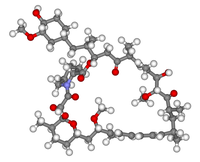
Photo from wikipedia
Multidrug resistance (MDR) is the leading cause of treatment failure in triple-negative breast cancer (TNBC) patients treated with doxorubicin (DXR). We aimed to investigate the potential of the antidiarrheal drug… Click to show full abstract
Multidrug resistance (MDR) is the leading cause of treatment failure in triple-negative breast cancer (TNBC) patients treated with doxorubicin (DXR). We aimed to investigate the potential of the antidiarrheal drug Loperamide (LPR) in sensitizing TNBC cells to DXR and elucidate the underlying molecular mechanisms. Therefore, we examined the effects of DXR alone or in combination with LPR on MDA-MD-231 cells viability using MTT assay, cell cycle, and apoptosis by flow cytometry, and the expression of the MDR-related genes (MDR1 and JNK1) and cell cycle/survival genes (p21, mTOR, and Bcl-2) by quantitative reverse transcription polymerase chain reaction. Results showed that adding LPR to DXR potentiated its antiproliferation effect and reduced its IC50 by twofolds compared with DXR alone. The value of the combination index of LPR/DXR was <1 indicating a synergistic effect. Combined DXR/LPR treatment also caused G1 arrest and potentiated apoptosis more than DXR-single treatment. At the molecular levels, LPR/DXR treatment downregulated the mRNA of MDR1 (1.35-folds), JNK1 (2.5-folds), mTOR (6.6-folds), Bcl-2 (9.5-folds); while upregulated p21 gene (8-folds) compared with DXR alone. Molecular docking analyses found LPR antagonizes MDR1 and JNK1 proteins, and hence supports the in vitro studies. In conclusion, the results confirmed the potential of LPR in sensitizing TNBCs to DXR by targeting MDR1 and JNK1 and suppressing Bcl-2 and mTOR genes, while upregulating the cell cycle inhibitor gene p21. Additionally, LPR could be repurposed to reduce the therapeutic doses of DXR as indicated by the dose reduction index (DRI) and subsequently decrease its side effects.
Journal Title: Journal of biochemical and molecular toxicology
Year Published: 2021
Link to full text (if available)
Share on Social Media: Sign Up to like & get
recommendations!